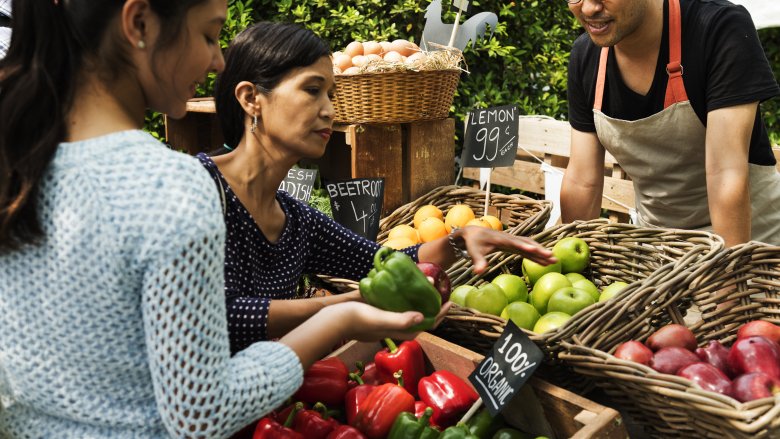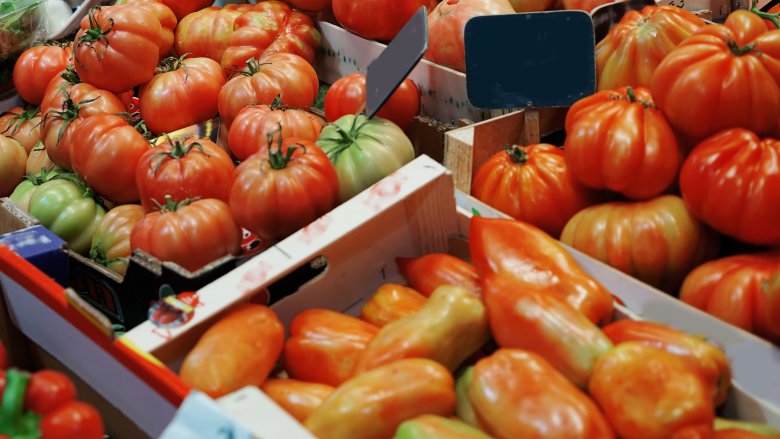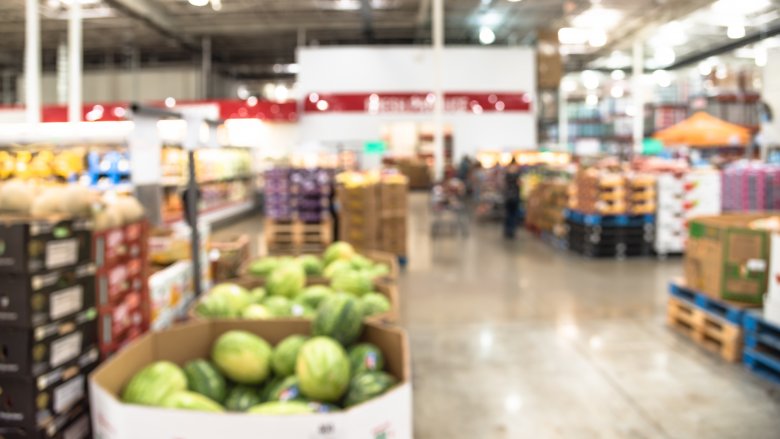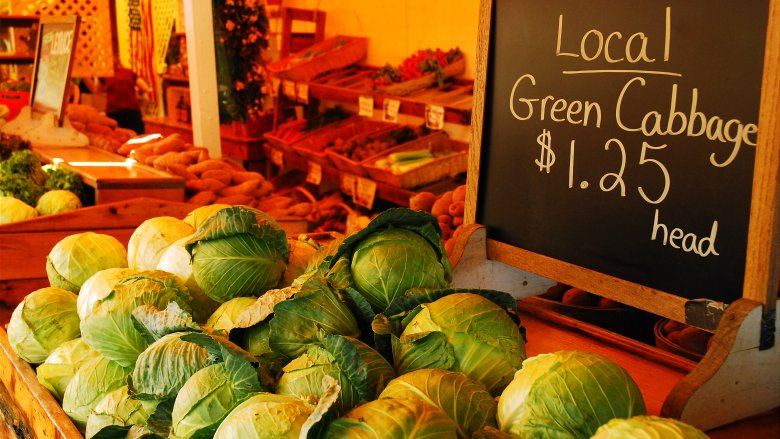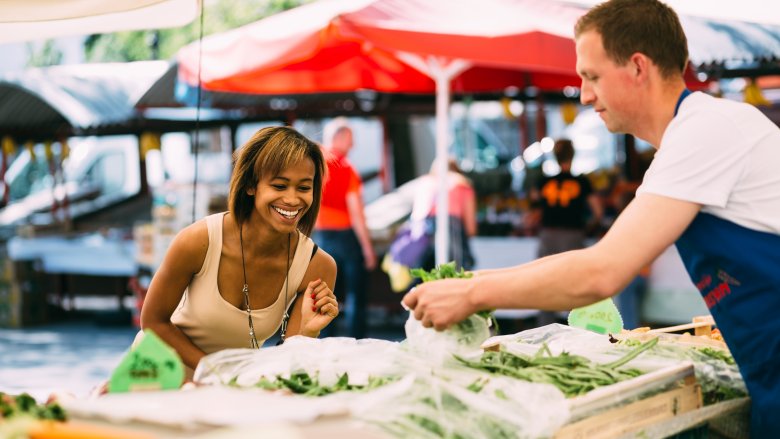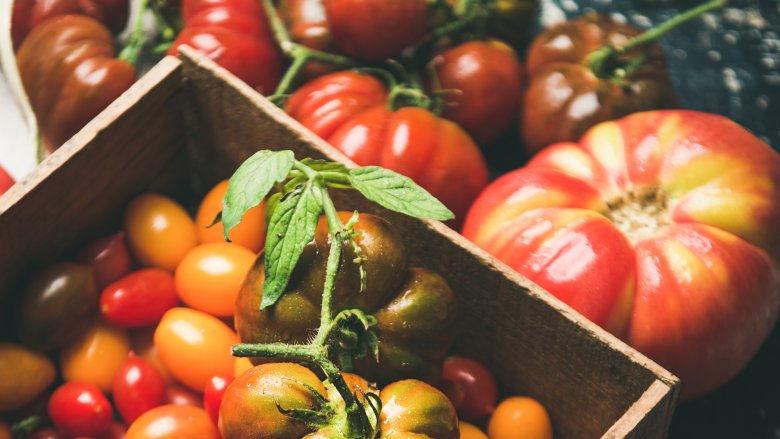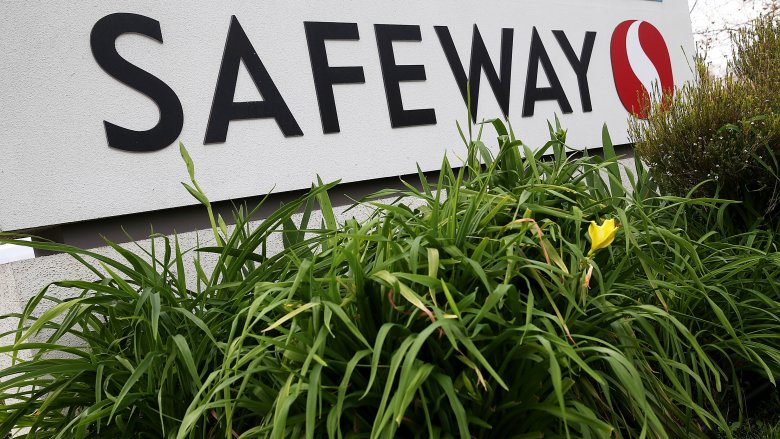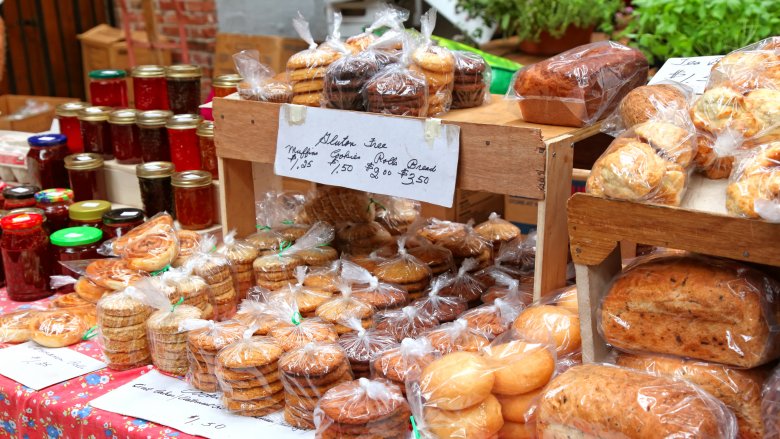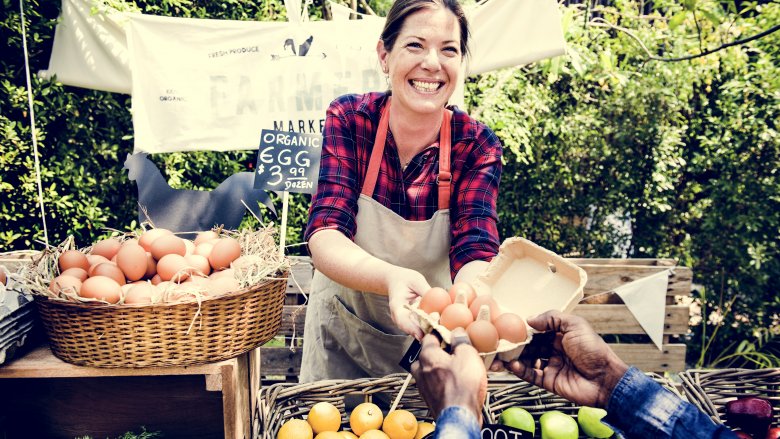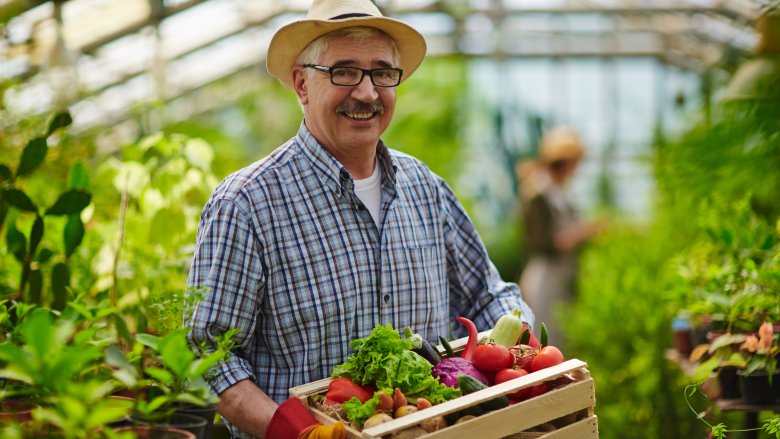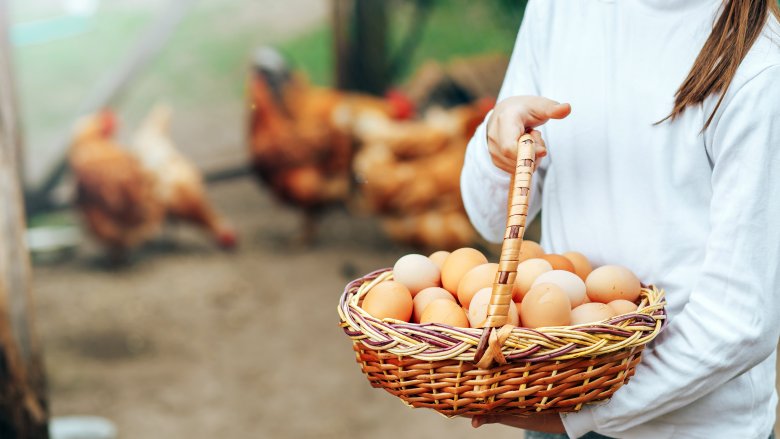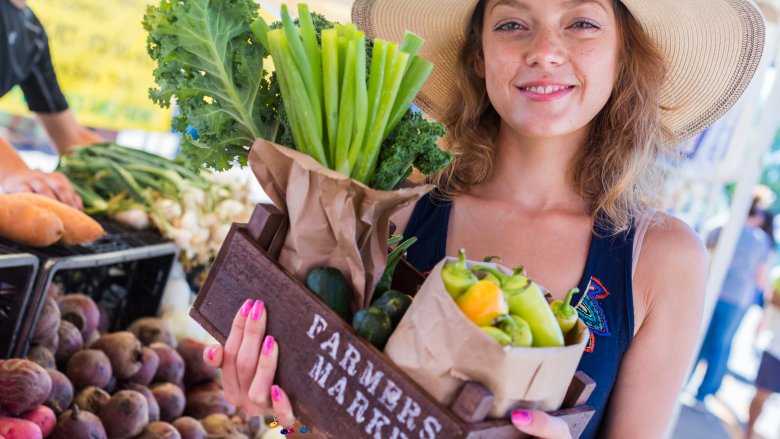Your Favorite Farmers Market Might Be A Scam
The summer months mean a lot of different things to different people, but if you love cooking with fresh food and supporting local businesses, the farmers market is the place to be.
Or, is it?
When you head off to your favorite farmers market, you're probably expecting to buy fruits, veggies, and all kinds of homemade goodness right from the source. The people you talk to are the ones that till the soil, plant the seeds, and water the crops, right? The ones that made that homemade jam from Grandma's tried-and-true recipe, or that hot sauce with help from Dad? Maybe not.
Some certainly are, but there's a shocking amount of lies and deception going on in that feel-good farmers market you swear by. The produce you bring back to your kitchen might not be what you think it is at all, and even worse, you might be hurting the same farmers you think you're helping. How? Let's talk about the untold truth of farmers markets.
What do you mean, scam?
So, what do we mean when we say farmers markets can be a scam? Let's start by saying there are different kinds of farmers markets, and the one you probably think of — where actual farmers are doing the selling — are a subset of markets called producer-only markets. That means it's in the market contract that only people who actually grew or made their products are allowed to sell them, and... shouldn't that be all markets?
It isn't, because according to the Houston Chronicle, even those rules are poorly enforced. And markets that aren't specifically producer-only are open to all kinds of sellers, including wholesalers and resellers. That means the flannel-wearing tomato-seller you see every week might not be a farmer at all. He might be a reseller, who buys cheap produce elsewhere then sells it, at the same time claiming to be a farmer who labored for long hours in the sun to bring all this wonderful produce right to you.
And it's a huge problem, so big CBC went undercover to investigate 11 Ontario markets. They found five of them had vendors reselling produce they'd bought elsewhere, and one was even advertising produce imported from Mexico as locally-grown.
You might be buying leftover, wholesale produce
CBC even found that some of these resellers had elaborate stories about their farms, their families, and how they grew this produce they actually picked up out of a box. Some vendors went to extremes to lie about their produce, but that brings up the question of where your haul of prized peppers was actually grown.
Tampa Bay Times food critic Laura Reiley wanted to know, too, and she found a shocking number of farmers market vendors in her area who were actually selling produce that had been shipped in from all over the country to Publix. After the grocery giant picked out what they wanted to buy and sell, the rejects were picked up by vendors who took them to the farmers market.
Outraged yet? Reiley found there's another way vendors get their produce. After a field gets harvested, people called gleaners come in and buy the produce that gets missed for a flat fee. That produce might then be sold to people called pinhookers, who get it to customers. That "farm-fresh" produce might not be fresh at all — it's possible it just spent the last week languishing in trucks.
The trouble with certification and labeling
"But," you say, "They're advertising things like fresh, locally-grown vegetables. Isn't that false advertising?"
Yes, but the customer is the only one who cares. Laura Reiley of the Tampa Bay Times says there is no widely accepted definition for words like "local." She found it being used to refer to anything sourced from within a six-state radius, an 8-hour drive, or a 400-mile radius. Would you consider that local?
There's another problem. While grocery stores are required to label foods with some basic information — like country of origin — farmers markets aren't held to the same labeling standards. That means a market in Georgia might be able to call something local when it's really been trucked in from another country, and they'll get away with it.
The flip side isn't any more helpful. If you're looking for something labeled organic, you should also know farmers who sell less than $5,000 worth of goods each year are exempt from needing official certification. Just because that little guy doesn't have official seals, that doesn't necessarily mean he's not organic... and skipping his stand might mean you're skipping the person you should really be buying from.
They might not be doing anything wrong... technically
This is all incredibly shady, right? But strangest of all, these resellers and lying vendors may be in 100 percent compliance with their local farmers market rules.
According to The Huffington Post, there's no single set of rules or laws governing farmers market vendors across the nation. Some states have general, statewide guidelines, but there's a huge difference between states. In New Hampshire, market vendors must be the farmers who grew the produce (and it's up to the market to vet their vendors to make sure they're telling the truth). In New Jersey, there is no legal definition of a farmers market at all.
FLAG is the Farmers' Legal Action Group, and they say there's quite a bit of wiggle room for each market to decide just what they're going to be. Markets with rules that allow resellers are said to allow "carrying," and FLAG adds that some markets believe it's necessary. It's claimed that resellers are needed in order to provide the diversity that gets customers stopping by, and whether or not that's legit is up to you to decide.
What's really in season?
You don't always need to request a copy of your local farmers market's rules and regulations in order to tell just what kind of market they are (although you might be inclined to do so). Laura Reiley of the Tampa Bay Times says there's one thing that's a dead giveaway, and you can spot it just by walking around the market before you stop to buy anything.
Before you head out, do a little bit of research into what's in season in your area. For a farmers market that has only truly, locally-sourced produce, that's all you should be seeing advertised as local. If it's apple and pumpkin season, for example, and you're also seeing vendors advertising their local blueberries and strawberries, that means you should start asking questions. The internet makes it easy to do your research, too: just use your zip code, and you should be able to find the information you're looking for pretty easily, even while you're standing in the market.
Sometimes, chain groceries are behind it
Now that you know a percentage of all that farmers market produce is made entirely of grocery store rejects, let's talk about something more surprising: Some of those farmers markets might be run by grocery stores trying to cash in on the growing trend of buying local.
In 2010, CBS News reported on finding a few farmers markets that had been organized and set up by both Safeway and Albertsons. In the case of Safeway, they found a few Seattle stores had set up tents in the parking lot, moved some of their produce outside, and then started advertising the area as a farmers market.
There was, of course, outrage from the governing body responsible for overseeing the state's markets, the Washington State Farmers' Market Association. The market didn't go away, though, Safeway only rechristened the area an "Outdoor Market." It's not technically deceptive, but at a glance, it definitely could be.
Even the people selling homemade goods might not be legit
All that fresh produce is only part of what makes a farmers market. There's also the people selling jams and jellies, salsa and sauces, baked goods, and even wines. You might like to think that the person who just sold you a jar of their strawberry jelly (grandma' recipe!) actually made it, but there's a chance they're not 100 percent legit, either.
As part of her expose on what really "farm fresh" really means, the Tampa Bay Times's Laura Reiley found that a number of the businesses set up at farmers market selling their "homemade" goods were sort of stretching the definition of the word. While it was true they may have developed the recipes themselves, many contract with large processing facilities that actually source the ingredients and make the product. That's not even close to being local or fresh, and she says it's easy to miss the fine print. It's there, though. Next time you pick up some hot sauce at the farmers market, read the label and see if there's a co-packer listed. That means the product was ordered from somewhere else, made in bulk, and shipped to the distributor you're buying from.
What are the signs something's up?
So, besides produce that's labeled as locally-sourced when it's definitely out of season, what are some other signs that indicate your favorite farmers market isn't as local as you might think?
According to Produce Retailer, there are a few things you should look out for. At the top of that list is vendors that use branded boxes to move and unload their merchandise — they're probably not just using those boxes because they're sturdy. Stickers on fruit and vegetables is an easy giveaway, but there's another clue that's less obvious: plastic clamshell packaging that's being used to hold the merchandise.
They also say you should be suspicious of fruit and vegetables that looks a little too perfect. If you or your neighbors have ever had a garden, you know that not everything comes out exactly the same. Small blemishes and imperfections are little things that don't hurt the quality of the product, but when they're not there, that's a sign you might be buying large-scale, commercially-grown produce. They also say that if you start chatting with the vendor and they don't have answers to questions about the farm and production process, keep moving.
How shopping at fake markets hurts real farmers
One point of shopping at a farmers market is to help local farmers, but by buying from these resellers, you may actually be hurting the farmers you're trying to help.
Since resellers have a bigger selection (because they're not limited to items that are locally-grown and in-season), they tend to draw a bigger crowd at farmers markets. And since they have less invested in their product — both physically and financially — they can usually sell at a cheaper price that real farmers can't compete with. When the Farmers Forum started asking legit growers how it impacted them, they found many had been forced out of farmers markets altogether because they just couldn't compete with the resellers. That's the exact opposite of what a farmers market should be, and if it continues, true farmers markets might not exist at all in the future.
How difficult is it to confirm farmers' stories?
When Laura Reiley started asking the tough questions to farmers market organizers, she found many were using the same excuse as to why they hosted resellers — even though it might be against the rules. Managers claimed it was too much work to vet every vendor to make sure they were legitimate farmers, so Reiley decided to see just how much work it was.
She chose one farmers market vendor at random, and it was Leonard Horak and his Circle 6 Farm & Ranch. She was suspicious of the dozens and dozens of eggs that he was selling, so she asked for directions to the farm and headed out there. She found Arlene Horak, hundreds of chickens, and a ton of work being done collecting almost 400 eggs each and every day. It took Reiley about five hours to confirm that the eggs sold from that vendor were legitimately produced by a local farmer.
All in all, that's not much time — you just have to decide it it's worth it.
Change might be on the horizon
This isn't all doom and gloom, because there might be changes coming in the future. California has been leading the way, and that's encouraging.
In 2014, NPR reported California governor Jerry Brown passed legislation allocating $1 million to creating a team of inspectors tasked with investigating farmers market fraud. That includes vendors who buy wholesale produce then try to pass it off as their own, and if all states follow California's lead, it would be a huge deal for small-scale farmers.
Also included in California's laws are stipulations that certified farmers must post signs letting consumers know they've grown what they're selling, and falsifying that information carries expensive penalties. According to Civil Eats, there is a nationwide movement that's trying to help regulate the market. The Farmer's Market Nutrition Program operates hand-in-hand with WIC, and was founded to help provide WIC recipients with fresh produce sourced through their local farmers markets.
They're all steps in the right direction, but when it comes down to it, it's the customers that are going to drive change. So, ask questions. Walk past the huge resellers, and buy from the small stands. Make sure you're supporting local farmers, and take the extra time to do so. They'll thank you for it.
